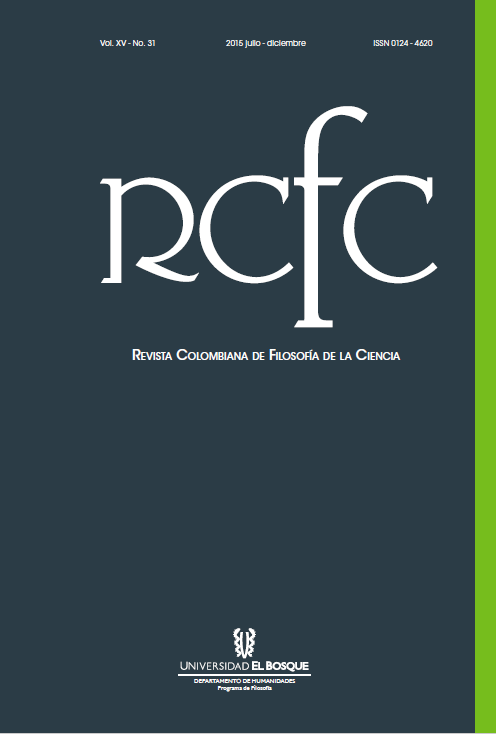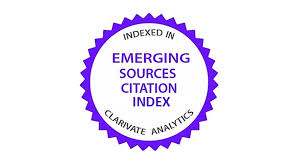El origen socio-histórico de la normatividad científica
DOI:
https://doi.org/10.18270/rcfc.v15i31.1280Resumo
Este artículo aborda el problema del origen de la normatividad epistémica de la ciencia desde un enfoque socio-histórico. Haciendo extensivo el modelo comunitarista de las prácticas lingüísticas a las prácticas científicas, sostiene que las normas científicas son instituciones, esto es, patrones estables de comportamiento colectivo generados y constituidos a través del desarrollo histórico de la investigación científica. Primero explica en qué consiste la normatividad en las prácticas lingüísticas, luego caracteriza la normatividad de la ciencia en tanto institución encargada de producir conocimiento sobre la naturaleza y, finalmente, discute algunas objeciones presentadas contra la perspectiva naturalista que subyace a esta comprensión socio-histórica de la normatividad.
Downloads
Referências
Barnes, Barry. “Social Life as Bootstrapped Induction.” Sociology, 4 (1983): 524-545.
Barnes, Barry; Bloor, David & John Henry. Scientific Knowledge. A Sociological Analysis. Chicago: The University of Chicago Press, 1996.
Bloor, David. Knowledge and Social Imagery. London: Routledge, 1976.
_____. Wittgenstein: A Social Theory of Knowledge. London: The Macmillan Press, 1983.
_____. "The Question of Linguistic Idealism Revisited." Cambridge Companion to Wittgenstein. Ed. Hans Sluga & David Stern. Cambridge: Cambridge University Press, 1996. 354-82.
_____. Wittgenstein, Rules and Institutions. London: Routledge, 1997.
_____. “Anti-Latour.” Studies in the History and Philosophy of Science, 30 (1999): 81-112.
_____. “Wittgenstein and the priority of practice.” The Practice Turn in Contemporary Theory. Ed. Theodore Schatzki, Cetina Knorr, & Eike von Savingny. New York: Routledge, 2001. 103-114.
_____. “Sociology of Scientific Knowledge.” Handbook of epistemology. Ed. Ilkka Niinilouto, Matti Sintonen, & Jan Wolenski. Dordrecht: Kluwer Academic Publishers, 2004. 919-962.
_____. “Epistemic Grace. Anti-relativism as Theology in Disguise.” Common Knowledge, 13.2 (2007): 250-280.
_____. The Enigma of the Aerofoil: Rival Theories in Aerodynamics, 1909-1930. Chicago: The University of Chicago Press, 2011.
Brandom, Robert. Hacerlo explícito: Razonamiento, representación y compromiso discursivo. Barcelona: Herder, 2005.
Feyerabend, Paul. Against Method. London: Verso, 1993.
Garver, Newton. This Complicated Form of Life: Essays on Wittgenstein. Chicago: Open Court, 1994. 269-287.
Giere, Ronald. Explaining Science: A Cognitive Approach. Chicago: University of Chicago Press, 1988.
_____. “Naturalism.” The Routledge Companion to Philosophy of Science. Ed. Martin Curd & Stathis Psillos. London: Routledge, 2014. 245-255. Print.
Guillaumin, Godfrey. “Normativismo histórico, una propuesta sobre la génesis de la normatividad epistémica de la ciencia.” Normas y prácticas en la ciencia. Ed. J. Miguel Esteban & Sergio F. Martínez. México: UNAM, 2008. 111-127.
Hacking, Ian. Representing and Intervening: Introductory Topics in the Philosophy of Natural Science. Cambridge: Cambridge University Press, 1983.
Huang, Xiang. “Dos acercamientos al problema del origen de la normatividad.” Normas y prácticas en la ciencia. Ed. J. Miguel Esteban & Sergio F. Martínez. México: UNAM, 2008. 35-60.
Huang, Xiang, & Sergio Martínez. “Introducción. Hacia una filosofía de la ciencia centrada en prácticas.” Historia, Prácticas y Estilos en la Filosofía de la Ciencia: hacia una epistemología plural. Comp. Godfrey Guillaumin, Xiang Huang, & Sergio Martínez. México: Universidad Autónoma Metropolitana, 2011. 5-63.
King, Patricia. “De las normas implícitas en prácticas lingüísticas a las normas implícitas en prácticas epistémicas.” Normas y prácticas en la ciencia. Ed. J. Miguel Esteban & Sergio F. Martínez. México: UNAM, 2008. 61-79.
Kripke, Saul. Wittgenstein on Rules and Private Language. Oxford: Blackwell, 1982.
Kuhn, Thomas. “The Function of Dogma in Scientific Research.” Scientific Change. Ed. Alistar Crombie. London: Heinemann, 1963. 347-369.
_____. “¿Lógica del descubrimiento o psicología de la investigación?” La crítica y el desarrollo del conocimiento. Ed. Imre Lakatos & Alan Musgrave. Barcelona: Grijalbo, 1975. 81-111.
Kusch, Martin. Knowledge by Agreement: the Programme of Communitarian Epistemology. Oxford: Oxford University Press, 2002.
Martínez, Sergio. “Un lugar para las prácticas en una filosofía de la ciencia naturalizada.” Normas y prácticas en la ciencia. Ed. J. Miguel Esteban & Sergio F. Martínez. México: UNAM, 2008. 151-167.
Medina, Jose. “Wittgenstein’s Social Naturalism: The Idea of Second Nature after the Philosophical Investigations.” The third Wittgenstein. Ed. Daniéle Moyal-Sharrock. Hampshire: Ashgate, 2004. 79-92.
Putnam, Hilary. “¿Por qué la razón no puede ser naturalizada?” Signos filosóficos, 18 (2007): 193-216.
Rouse, Joseph. How Scientific Practices Matter: Reclaiming Philosophical Naturalism. Chicago: University of Chicago Press, 2002.
Shapin, Steven. “Social Uses of Science”. The Ferment of Knowledge. Ed. G. S. Rousseau & Roy Porter. Cambridge: Cambridge University Press, 1980.
_____. “History of Science and its Sociological Reconstructions.” History of Science, 20 (1982): 157-211.
_____. A Social History of Truth: Civility and Science in Seventeenth-Century England. Chicago: University of Chicago Press, 1994.
_____. Shapin, Steven, and Simon Schaffer. Leviathan and the Air-Pump: Hobbes, Boyle, and the Experimental Life. Princeton: NJ, 1985.
Westman, Robert. “Proof, Poetics, and Patronage: Copernicus’s Preface to De Revolutionibus.” Reappraisals of the Scientific Revolution. Ed. David Lindberg & Robert Westman. Cambridge: Cambridge University Press, 2004.
_____. The Copernican Question: Prognostication, Ekepticism and Celestial Order. Berkeley: University of California Press, 2011.
Wittgenstein, Ludwig. Remarks on the Foundations of Mathematics (RFM). Oxford: B. Blackwell, 1956.
_____. Philosophical Investigations (FI). Oxford: Blackwell, 2001.
Downloads
Publicado
Como Citar
Edição
Seção

| Métricas do artigo | |
|---|---|
| Vistas abstratas | |
| Visualizações da cozinha | |
| Visualizações de PDF | |
| Visualizações em HTML | |
| Outras visualizações | |











